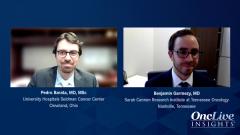
Considerations in Advanced RCC Treatment Selection
Pedro Barata, MD, MSc, and Benjamin Garmezy, MD, outline factors taken into consideration when selecting advanced RCC treatments.
Episodes in this series

Transcript:
Benjamin Garmezy, MD: When you think about it, who wouldn’t you give immunotherapy to? It’s those patients who have autoimmune disorders and disorders like that. But even some of those, if it’s a mild psoriasis or a mild rheumatoid arthritis, I’m trying to challenge them with a single-agent immunotherapy with TKI [tyrosine kinase inhibitor] combination. I probably would avoid the doublet immunotherapy combinations in those patients for obvious reasons of concerns about flare-up of autoimmune toxicity. But ultimately, I agree with you, I don’t think there’s a patient for single-agent TKI anymore. You could make an argument for IO [immuno-oncology]–TKI combinations. Some folks might even make an argument for single-agent immunotherapy combinations in patients who have high-risk factors for TKI toxicity, though that’s not as commonplace. If you wanted to, instead of giving a low dose of a TKI or a TKI monotherapy because you didn’t think the patient needed aggressive therapy, you could argue that active surveillance is still an option for some patients with certain biology of clear cell renal cell with very slow progressing tumors instead of single-agent monotherapy TKI, which is unlikely to cure any patient. Right?
Pedro Barata, MD, MSc: Right. It’s funny that you highlight that because I recall that data, as well. I’m thinking about the trial by Dr Rini in Lancet Oncology. The time of initiation of systemic therapy for a selected group of patients was close to a year and a half, which is to your point. There are some cancers and tumors where it’s safe to just check your scans, and those of indolent growth are appropriately considered for active surveillance. I would argue that in my practice, with maybe 1 out of 10 patients, I’m going to end up giving a TKI monotherapy.
The minority are those—in addition to your point where you don’t feel comfortable or don’t think it’s safe to offer an IO approach—I’m thinking about the elderly patient population, those patients who have many comorbidities and whose life expectancy won’t be impacted by kidney cancer. Often, I’ve used this on and off intermittently where I keep them on for a while, you shrink the tumor, and then you stay off, and then until the tumor regrows back to where it was before, you offer them quality of life because some of these TKIs, sunitinib and even pazopanib, can pose adverse effects. I’ve done that strategy. Again, this is for the minority of the patients, but we see those patients, too. It’s not the majority, but they do come [into the clinic] and our goal is to control their cancer while they are dealing with other health-related problems.
Dr Garmezy, we talked a little bit about risk, and you shared your thought process when you walk through all the options available. Do you use the risk groups that we talked about, IMDC [International Metastatic RCC Database Consortium] and the Memorial Sloan Kettering [Cancer Center] group? Or do you use a different strategy? How do you stratify your patients in clinic?
Benjamin Garmezy, MD: I’m exclusively using IMDC risk. Then the question is, how does that impact what you do? The short answer for me is, not a whole lot. My preferred typical patient with clear cell RCC is going to get an IO-TKI therapy, and that’s been shown as beneficial across favorable, intermediate, and high-risk IMDC groups. The data is less clear how important that immunotherapy component is in that low-risk IMDC criteria. More data subsets that get presented from all these trials suggest that that’s the group that TKI monotherapy vs TKI-IO combinations may not have as much of a difference, but also remember that immunotherapy doublets don’t have a benefit compared with sunitinib in that patient population. That’s why ipilimumab and nivolumab are approved for intermediate- and high-risk patients only. If I see a patient with any IMDC risk score, outside of those sarcomatoid features, those rhabdoid features, I’m generally reaching to IO-TKI outside of what we alluded to. While I’m doing it for everyone, it’s informing my practice on what to expect prognostically going forward, but it’s not informing too much of my selection in the frontline. How does your practice compare?
Pedro Barata, MD, MSc: I agree with you completely. I use IMDC as well. It became the dominant risk score. Of course, then it comes to those details, and the devil is in the details, right? I don’t think the risk groups scores that we have are perfect. They don’t capture things like location of metastatic disease. It doesn’t directly capture symptomatic disease. So for those factors, I care. Location of metastases. It doesn’t capture presence or absence of sarcomatoid or rhabdoid right away, and in my African American population, I see a bit more non-clear cell; it’s not applicable there. There are a few no answers to the thought process. I tend to do an IO-TKI in the non-clear cell because of the data that has been emerging that built on the TKI cabo [cabozantinib] vs sunitinib on PAPMET. In clear cell, I use those factors to make a decision about where to go.
Transcript edited for clarity.




































